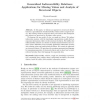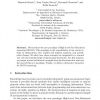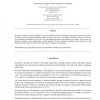1634 search results - page 29 / 327 » Reasoning about Knowledge Using Rough Sets |
TRS
2008
13 years 7 months ago
2008
In this paper, we discuss an approach to structural objects based on a generalisation of indiscernibility relation used in rough set theory. The existing results in rough set theor...
MICAI
2000
Springer
13 years 11 months ago
2000
Springer
We introduce the new paradigm of High-Level Non-Monotonic reasoning (HLNM). This paradigm is the consolidation of our recent results on disjunctions, sets, explicit and implicit ne...
LPNMR
2004
Springer
14 years 1 months ago
2004
Springer
This paper develops a declarative language, P-log, that combines logical and probabilistic arguments in its reasoning. Answer Set Prolog is used as the logical foundation, while c...
IJCAI
1993
13 years 9 months ago
1993
Though arrangement knowledge is well suited for qualitative representations of spatial situations, if we only use this kind of knowledge, we cannot do interesting inferences about...
AAAI
1990
13 years 9 months ago
1990
Since knowledge bases (KBs) are usually incomplete, they should be able to provide information regarding their own incompleteness, which requires them to introspect on what they k...



